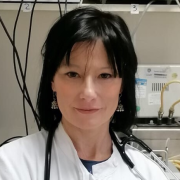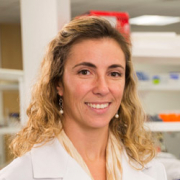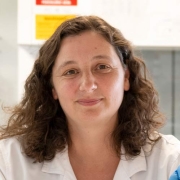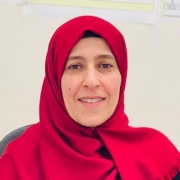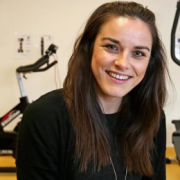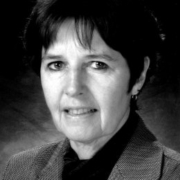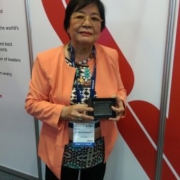- What is your role at your work?
My role is Senior Hospital Scientist in the Department of Cardiology, which involves patient studies for the Ambulatory BP Monitoring Service that I run as well as research, both clinical and biomedical. I also have teaching responsibilities which include lectures to nursing students, general practitioners and up until last year, problem-based learning to medical students.
- How did you get interested in your career path?
As an undergraduate Science student I was fascinated by the cardiovascular responses during my Pharmacology Major. My enthusiasm during my Honours degree was recognised by my Supervisor who invited me to enrol in her PhD project for developing an animal model of heart failure.
I did not have the conventional post-doctoral career path, and moved from biomedical research to train and engage in clinical trials into hypertension management with Professor Stephen Hunyor, within the NHMRC Cardiovascular Research Unit, Royal North Shore Hospital. It is during this period, while we were developing and testing finger blood pressure monitoring, that I recognised my passion for accurate measurement of blood pressure.
- What are you most proud of in your career or otherwise?
– Receiving the International Society of Hypertension Award for Best Research for my biomedical research identifying the cardiac actions of the adrenal hormone aldosterone.
– Being invited to be a Fellow of the American Heart Association and Council of Basic Cardiovascular Sciences.
– Reuniting the students that I mentored who are now Interventional Cardiologists and independent researchers as well as heads of Departments.
– Developing an elearning training module for standardising clinical measurement of blood pressure included in curriculum for University of Sydney Nursing School. The web-based version is accredited by the Royal College of Australian General Practitioners and available to all Northern Sydney Local Health District sites which includes 5 acute hospitals, a psychiatric facility at Macquarie Hospital and 50 community health sites.
- What important career challenges have you faced and how did you overcome them?
Working in a Health Service where biomedical scientists are restricted to laboratories rather than the Clinic. A female Health Service Manager informing me that “scientists should not be measuring blood pressure or consulting with patients”. I continue with my passion for empowering patients through education.
- What advice would you give your younger self?
Find a mentor who supports you, and keep going!
- Highlight your most significant research contributions and publications (3-5) – if relevant to you.
Mihailidou AS, Le TYL, Mardini M, Funder JW. Glucocorticoids activate cardiac mineralocorticoid receptors during experimental myocardial infarction. Hypertension 54:1306-1312, (2009). 150 citations
This paper resulted in a paradigm shift in the research field of “aldosterone receptors” to identify these receptors in the heart were not only activated by aldosterone but also by cortisol during myocardial infarction with the same deleterious effects to aggravate cardiac injury. These studies also showed that mineracorticoid receptor blockade is cardioprotective at low doses and have direct clinical implications for understanding how low-dose MR antagonists have been so effective in large clinical trials. The significance of this research was highlighted at a Plenary Session of the Endocrine Society Annual Scientific Meeting.
Head G, Mihailidou AS, Duggan K, Beilin LJ, Berry N, Brown MA, Bune A, Cowley D, Chalmers JP, Howe PRC, Hodgson J, Ludbrook J, Mangoni AA, McGrath BP, Morley CM, Nelson MR, Sharman JE, Stowasser M. Relationship between ambulatory and Clinic Blood Pressure: Defining diagnostic and treatment targets. British Medical Journal 340:Issue 7751:c1104; 1-8, (2010). 91 Citations
This is an example of translating my research to clinical practice, as one of the founding members of a National collaborative that established ambulatory blood pressure equivalents for hypertension management. These were recognized and included in the UK’s National Institute for Health and Clinical Excellence guidelines.
Head GA, McGrath BP, Mihailidou AS, Nelson MR, Schlaich MP, Stowasser M, Mangoni AA, Cowley D, Brown MA, Ruta L-A, Wilson J. Ambulatory blood pressure monitoring in Australia: 2011 consensus position statement. Journal of Hypertension 30:253–266 (2012). 61 Citations
The clinical research inspired revision of the Australian Guidelines for Ambulatory Blood Pressure monitoring which was a collaboration between the High Blood Pressure Research Council of Australia and National Heart Foundation.
Phillips CL, Grunstein RR, Darendeliler MA, Mihailidou AS, Srinivasan VK, Yee BJ, Marks GB, Cistulli PA. Comparison of Health Outcomes of CPAP versus Oral Appliance Treatment for Obstructive Sleep Apnea: A Randomised Controlled Trial. American Journal of Respiratory and Critical Care Medicine. 187: 879-887 (2013). 129 Citations
This research was identifying the efficacy of new oral appliance against the gold standard of CPAP for obstructive sleep apnea as part of an Australian government funded research project. The device is now used in clinical practice.
Le TYL, Ashton AW, Mardini M, Stanton PG, Funder JW, Handelsman DJ, Mihailidou AS. Role of androgens in sex differences in cardiac damage during myocardial infarction. Endocrinology. 155: 568-575 (2014). 13 Citations
This research is from my biomedical research laboratory and defined the molecular mechanisms for sex differences in ischemic heart disease (IHD) which were poorly defined. Most studies focused on protection by estrogen, with less attention on androgen receptor mediated androgen actions. My research demonstrated for the first time that sex steroids regulate autophagy during myocardial infarction and shows that a novel mechanism of action for androgens during IHD is downregulation of antiapoptotic protein that is a key controller for crosstalk between autophagy and apoptosis, shifting the balance towards apoptosis and leading to aggravated cardiac damage.
- Have you had any significant career mentors? If yes, please provide further details.
Professor Anthony Goodman and Professor Rosemarie Einstein.
Tony Goodman was a Reader in Surgery and an Inventor when I started my Honours degree. He developed a microcirculation flow probe which Texas A&M University sponsored and appointed him as Professor. He taught me surgical skills which I have transferred to my students. Tony was very supportive and encouraged me to display confidence in my skills and knowledge.
Rosemarie was my PhD Supervisor and a pioneer “STEMM leader”. I am very grateful for her support for my research but also encouragement to overcome my shyness and reveal my passion for enquiry. I have adopted her skills of independence and perseverance and no longer hide my passion for research.
- How can we support the next generation of women scientists?
Encourage a team mentor program which includes both a female mentor and male change champion for providing support and insight to the barriers for career promotion encountered by women.
More balanced representation of women as speakers at conferences and committees to support women in confidently expressing confidence without self-questioning their ability.













